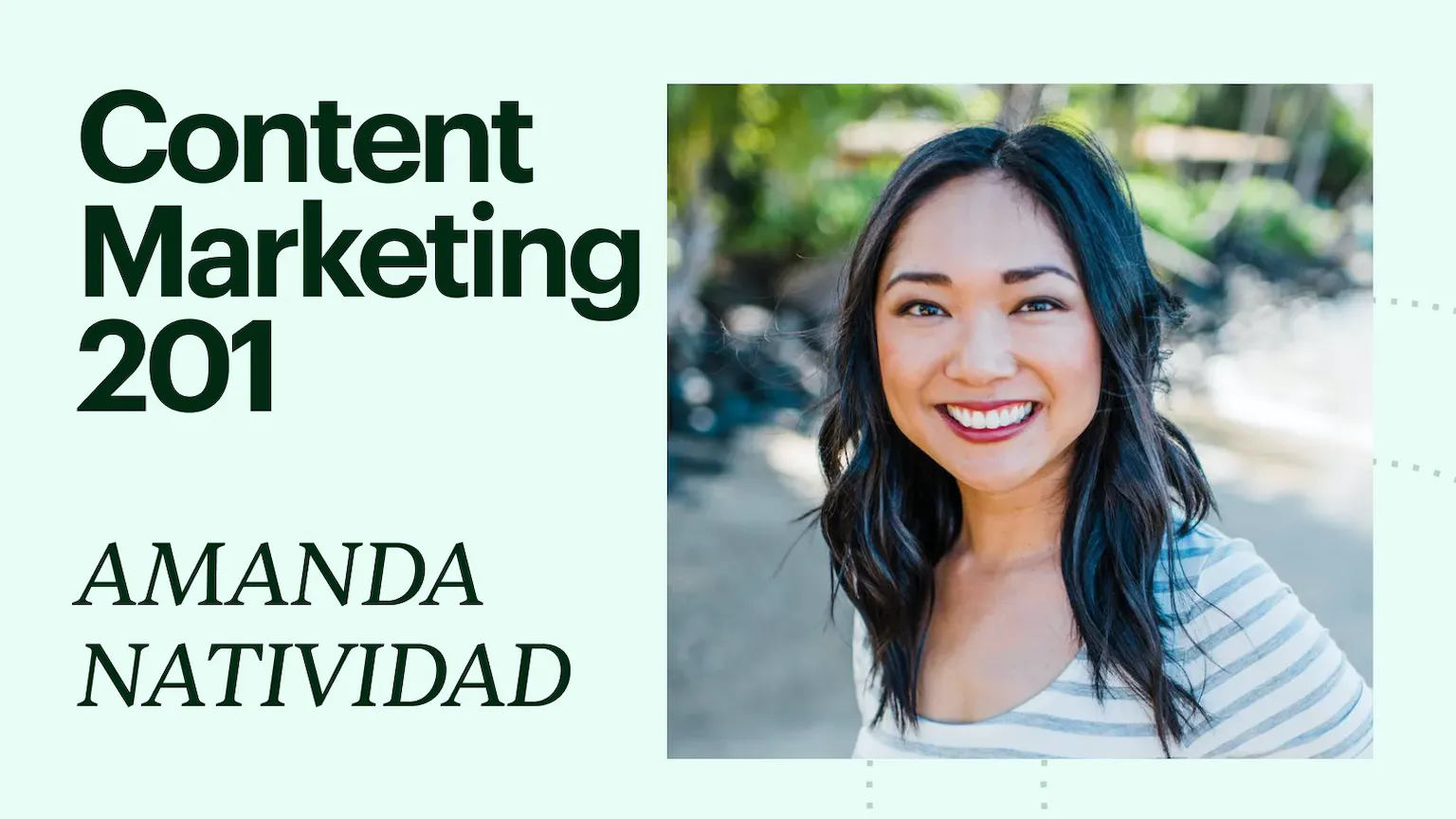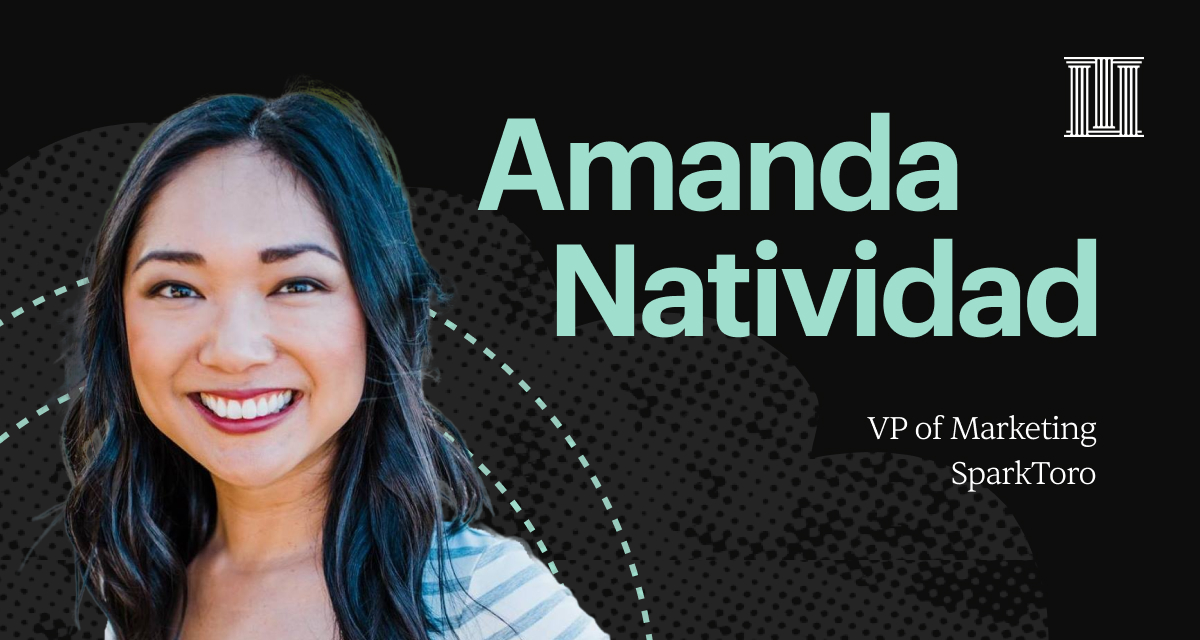In the ever-evolving realm of digital marketing, Amanda Natividad emerges as a beacon of expertise. Currently donning the hat of VP of Marketing at SparkToro, Amanda's multifaceted career has touched various facets of the industry, from content strategy to audience research. Her stint at SparkToro, co-founded by the well-known Rand Fishkin, has been particularly insightful, where she consistently illuminates the interplay between SEO and
content marketing.

Engaging her audience through diverse platforms, be it her podcast or the intricate webinars she hosts, she underscores the significance of robust audience research. Her outreach on social media platforms like LinkedIn and Twitter, complemented by her writings on 'amandanat,' further accentuates the depth of her expertise.
Delving deeper into Amanda's viewpoints, one grasps the essence of her philosophy: While SEO is a formidable tool in the marketer's arsenal, it cannot overshadow the integral role of a holistic content marketing approach. With her association with top-notch brands like Fitbit and NatureBox, she brings to the table a blend of industry experience and innovative frameworks.
Her musings on zero-click content, her case studies that detail metrics and outcomes, and her emphasis on
personal brand building all converge to offer a panoramic view of the contemporary marketing landscape. For those navigating the intricate waters of
marketing strategy, Amanda's insights serve as a reliable compass, ensuring a balanced blend of organic reach and genuine audience connection.
5 Reasons Why SEO Can’t Replace a Content Marketing Strategy
These days, the interplay between SEO and content marketing is more pronounced than ever. The dynamic synergy they create forms the backbone of most effective online campaigns. While SEO lays the groundwork, ensuring content reaches the intended audience, the heart and soul of the endeavor lie in the narrative, insights, and value that content marketing brings.
Think of it as a beautiful dance where SEO sets the stage, but content leads the performance. With this delicate dance in mind,
Amanda Natividad brings forth her insights, shedding light on the nuances and offering a deeper dive into why SEO can't eclipse a content marketing strategy:
1. SEO Strategy Complements but Doesn’t Replace Content Marketing
In the intricate dance of
digital marketing, SEO and content marketing move together, but they play distinct roles. Imagine SEO as the stage—setting the scene and making sure there's an audience. Apple's success, for instance, isn't just because of their top-tier algorithms and technical prowess. It's the stories they tell, the emotional strings they pull, and the narratives they weave. Content is that deep narrative.
On the other hand, tools like Liftopia or NatureBox use the power of compelling content to connect with their audience, creating a bond that transcends mere discoverability. The
art of copywriting comes alive here, blending with SEO but shining in its unique light, emphasizing the genuine connection between brand and audience.
2. SEO Drives Organic Traffic and Global Content Visibility
Much like how Spotify's algorithm curates playlists tailored to individual tastes, SEO crafts the digital path,
leading potential customers to the content most suited to them. It serves as the digital beacon, ensuring that across the vast expanse of the internet, those in search of specific content are directed to it. But the journey doesn't end at discovery.
While strategies such as co-marketing can amplify this reach, the true essence of retaining an audience lies in the content itself. Its relevance, depth, and authenticity are what transform a fleeting click into a meaningful engagement. It's a testament to the fact that while SEO might open the door, it's the quality of content that invites the visitor to stay.
3. Relying Solely on SEO Metrics Is Insufficient for Content Success
Metrics
provide a roadmap, a set of signposts indicating content performance. They're the numerical story of reach, clicks, and engagement. However, like the backstage crew at a concert, while they're integral to the show, they aren't the show itself. The heart of content beats in its ability to resonate, to evoke emotion, and to connect.
Sparktoro.com, a hub for marketers, frequently touches upon this intrinsic value of content. It's the deeper, more intangible rewards that content reaps. Outreach might introduce your brand to new audiences, but it's the stories you tell and the experiences you share that create lasting memories and brand associations.
4. New Sites Take Around Six Months to Gain Authority and Rank
Building a website's authority is a journey, not a sprint. Just as artists on platforms like Substack or Spotify don't gain overnight traction, websites need time, patience, and consistency. It's the digital version of paying one's dues, ensuring that when the spotlight does come, it shines brilliantly.
During this incubation period, the focus should be on crafting impeccable content. Think of a test kitchen cook, patiently perfecting each dish, refining every element. Similarly, a brand's content should be honed, engaging, and tailored to its audience, ensuring that when SEO does its job, visitors are met with unparalleled quality.
5. Setting Short-Term Content Goals Is Crucial for Long-Term Success
Every master plan is built upon a series of smaller, actionable steps. In content strategy, while the horizon might be set on long-term SEO gains, the path is paved with short-term content goals. These milestones, whether they revolve around engagement, outreach, or brand-building, ensure content remains fresh and relevant.
In the hustle and bustle of the digital world, where trends can shift overnight, agility is an asset. B2B marketing, especially, demands an ear to the ground, a readiness to adapt. By setting clear short-term objectives, brands can ensure they're always in tune, always ready, and always delivering precisely what their audience desires.
Boost Your Marketing Strategies For Increased Growth
Amanda Natividad's teachings not only shine a light on the intricate relationship between SEO and
content marketing but also champion the idea of a holistic approach to digital presence. Drawing from her experiences and the cases she has outlined on
various platforms, she emphasizes the need for marketers to strike a balance, ensuring that while they tap into the vast potential of SEO, they don't sideline the raw, emotive power of content.

Maven, recognizing the sheer depth and breadth of Amanda's expertise, offers courses that encapsulate her learnings. Enrolling in her course
Content Marketing 201 means not only accessing her insights but also aligning oneself with Maven's commitment to quality and excellence. After all, when it comes to curating courses from the industry's best, Maven has carved its niche. Immerse yourself in Amanda's teachings and arm yourself with strategies that promise not just growth, but an enduring resonance with your audience.






